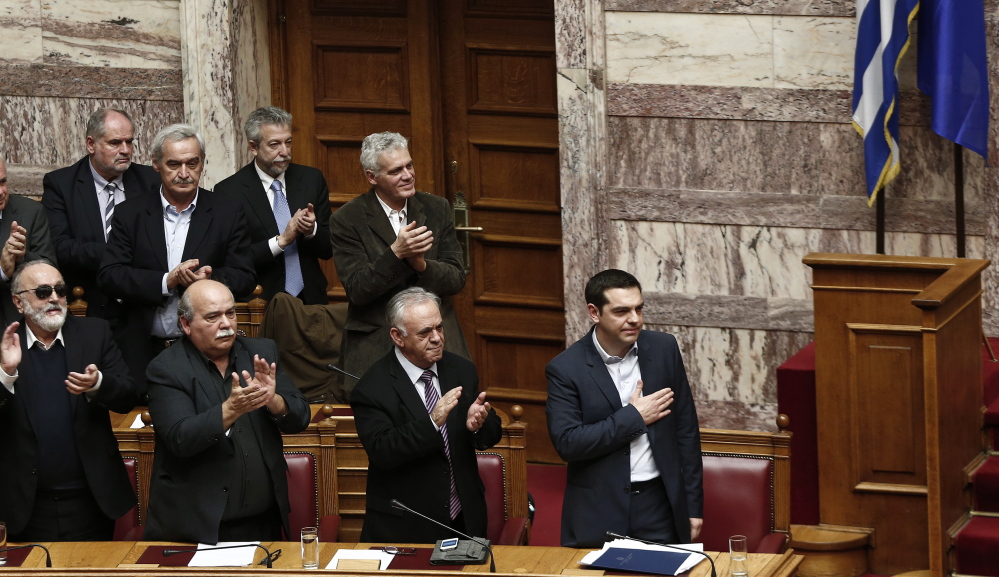ATHENS, Greece — New Prime Minister Alexis Tsipras set his leftist government on a collision course with Greece’s creditors Sunday, proclaiming an end to the era of austerity and “five years of bailout barbarity.”
Tsipras presented his government’s policy statement to Greek lawmakers which included, as he had forewarned, all the promises made by his radical left party, Syriza, in its manifesto before last month’s election.
The government “has taken the irrevocable decision to stick fully to its pre-election commitments,” Tsipras said, indicating that he would not compromise on his party’s positions.
By demanding a “bridge agreement” that would give Greece and its creditors time to negotiate a new debt deal much more favorable to the country by June, Tsipras appeared to stick to an approach that got short shrift from European Union partners in a series of meetings that Tsipras and his finance minister had with European officials this past week.
“If our (EU) partners are willing, we can agree (on a bridge agreement) tomorrow morning,” Tsipras said.
But this would mean the rest of the EU abandoning its declared policies and giving in to Syriza’s demands.
“The (bailout deal) has been abolished by popular mandate,” Tsipras said, referring to the two deals that have kept debt-ridden-Greece solvent and provided a historically unprecedented $271.4 billion in assistance.
This aid also went with austerity policies that shrank Greece’s economy by a quarter and resulted in record unemployment, with more than a quarter of the workforce jobless.
Having come to power as a result of a popular backlash against these measures, Tsipras geared his speech completely toward a domestic audience, insisting that it is the EU that must return to its “founding principles of solidarity, social cohesion, growth and democracy.”
“We declare categorically, we will not negotiate our history. We will not negotiate this people’s pride and dignity,” said an emotional Tsipras.
The current bailout deal runs until late February, but Tsipras said the government is “not entitled to ask for an extension,” while blasting the previous government for rejecting an EU proposal to extend the deal to June so that a Syriza-led government would face tight deadlines.
“They burned the crops and blew the bridges,” Tsipras said of the previous conservative-socialist coalition government.
Syriza’s own program includes measures to provide relief for the poor, such as free meals, free electricity and free health care; relief for the middle class by abolishing an unpopular property tax and replacing it with a tax on very large property; and sops to his supporters, such as the abolition of university reform and a re-establishment of the state TV and radio broadcaster that was shut down in 2013 and replaced by a slimmed-down version. But a pledge to raise the minimum wage to pre-crisis levels will be done in two stages and not realized until 2016.
Copy the Story LinkSend questions/comments to the editors.



Success. Please wait for the page to reload. If the page does not reload within 5 seconds, please refresh the page.
Enter your email and password to access comments.
Hi, to comment on stories you must . This profile is in addition to your subscription and website login.
Already have a commenting profile? .
Invalid username/password.
Please check your email to confirm and complete your registration.
Only subscribers are eligible to post comments. Please subscribe or login first for digital access. Here’s why.
Use the form below to reset your password. When you've submitted your account email, we will send an email with a reset code.